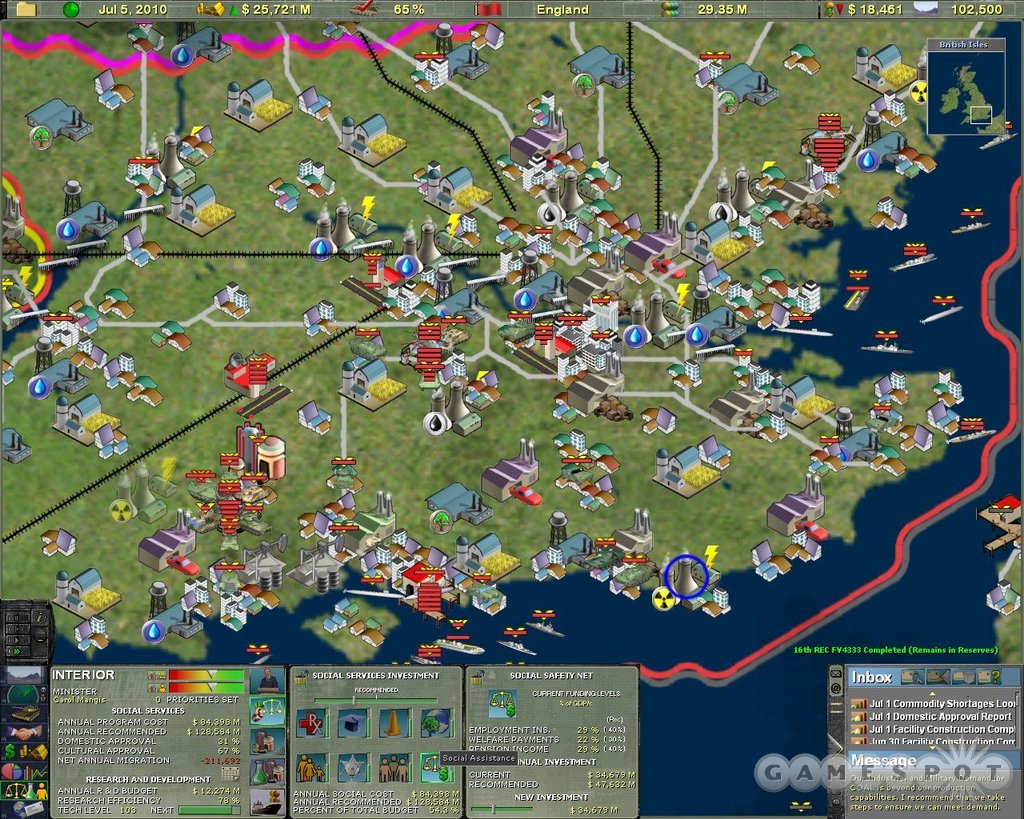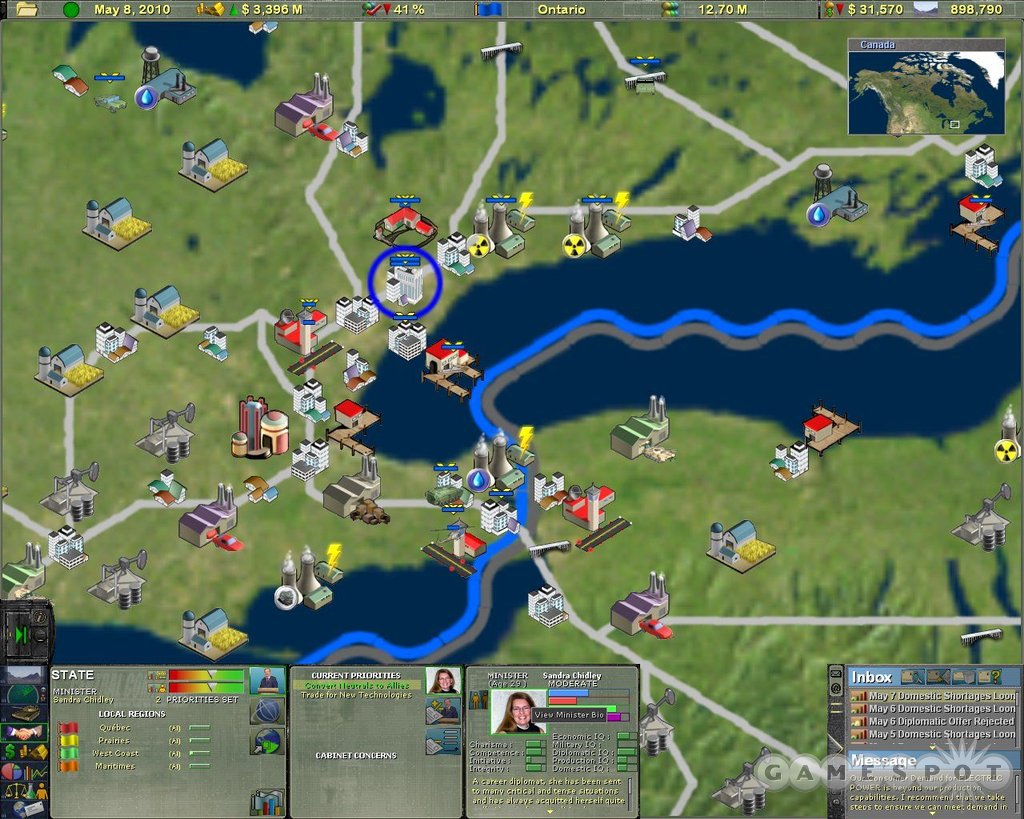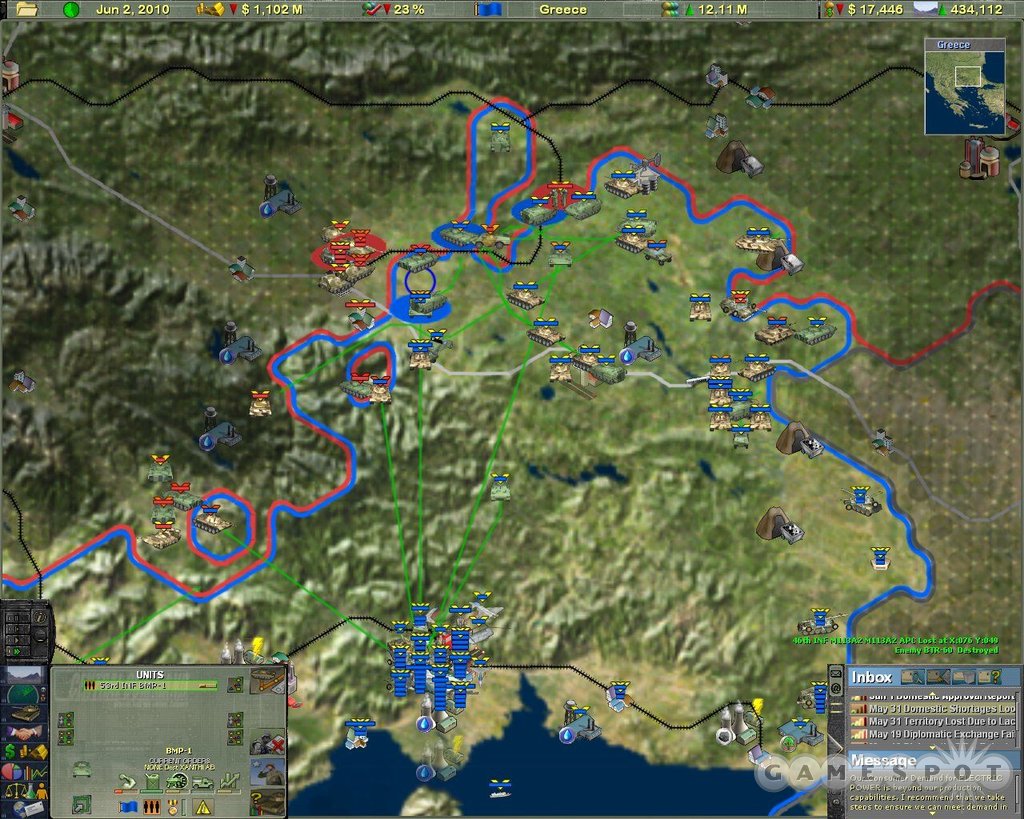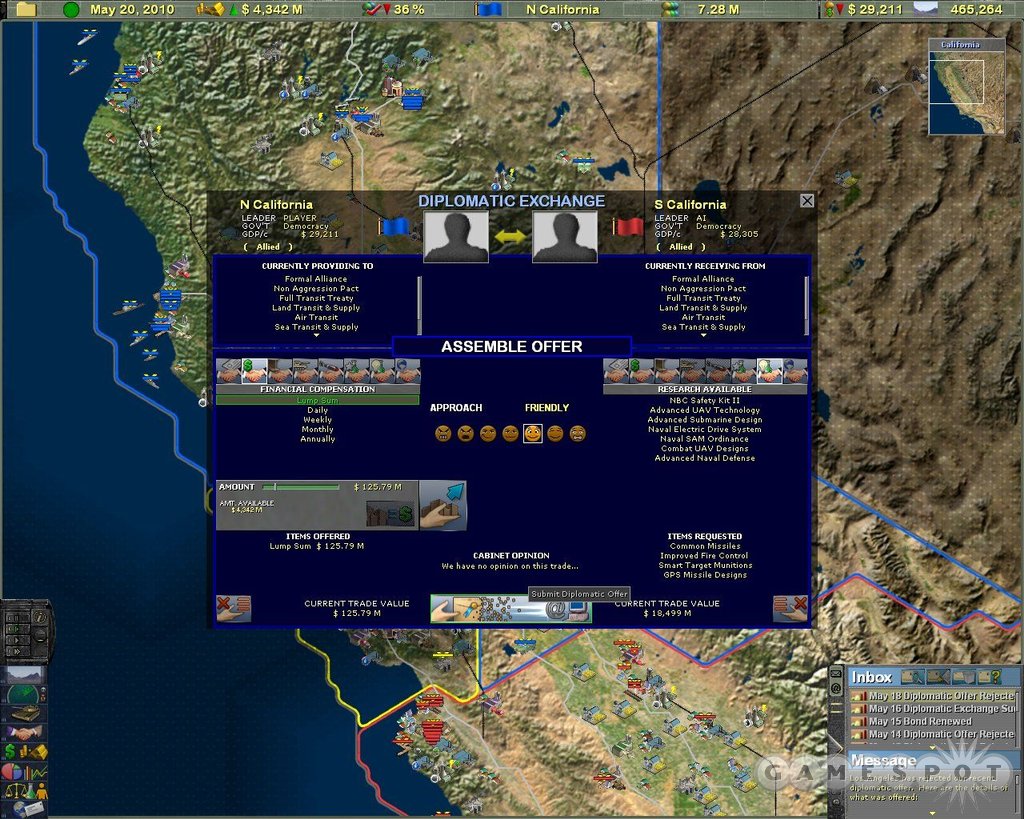Ambition isn't always a good thing in strategy-game design. When developers push the envelope too far, they often end up with either an interface that plays like a logic puzzle, or so many statistics that it would be less painful to smack yourself in the face with an economics textbook. So it's something of a miracle that Supreme Ruler 2010 is downright user-friendly. Even though the BattleGoat Studios production is as elaborate as anything this side of the rather boat anchorlike SuperPower 2, this is one playable and enjoyable geopolitical simulation. Complexity and accessibility are rarely so well-balanced in a strategy game.

First impressions won't leave you with that idea, however. BattleGoat and publisher Strategy First ship the game with a dense 150-page manual and terse tutorials with no interactivity aside from that provided by reading dozens of text boxes. The background story is also complex. Four pages are required to recount the tale of a debt-ridden United States, which is self-destructing economically and taking the rest of the planet with it. OPEC reacts to American troubles by changing the world's oil currency from greenbacks to Euros in mid-2005, and this causes the biggest market crash in history. Economies are so devastated that most nations splinter along regional and ethnic lines. When the game begins in 2010, the US is a collection of independent states, the Canadian provinces have abandoned confederation, Europe has broken into fiefdoms reminiscent of the medieval era, and so on.
You're dropped into this mess as the ruler of one of these new independent territories. Play can be turn-based or real time. Both function in similar ways, although playing in turns slows the action down so much that it's a better option to go real time and adjust speeds or pause the game whenever catastrophes pile up. Objectives vary, with you either attempting to emerge as the leading state in a specific region in a couple of dozen scenarios (reunifying Canada, putting China back together by force, taking over the Middle East with a unified Israel-Jordan, and so on) spread across the world or trying to conquer the planet in the global campaign.
Difficulty varies depending on your choice here, of course. Taking on, well, everybody as the newly free state of Scotland is a lot more difficult than simply helping Alabama win over its neighbors in what used to be the southeastern US. There are a lot of nations on the globe, too, with virtually every province, state, or territory in North America, Europe, Asia, Africa, and Australia deciding to go it alone. Each one of these mini-states is fully modeled, too, with governments, military forces, economies, natural resources, social services, taxation systems, and so forth.
Regardless of what mode of play you choose, cabinet ministers keep games from becoming unwieldy. Instead of handling all of a state's affairs by yourself, you hire ministers from a pool of candidates to look after six portfolios--defense, military operations, state, treasury, commerce, and interior--and keep your eyes on the big picture. Policies are set by assigning priorities to each member of the cabinet, like asking the interior minister to improve the nation's technology, or the minister of state to secretly undermine enemies, or the minister of commerce to produce products for export. Every move has its pros and cons, so there are no shortcuts when it comes to making your citizens happy. Order your interior minister to improve the social safety net, for instance, and this sets up a tug-of-war between social assistance programs and the military.

And since ministers come with names, detailed biographies, personalities, and political leanings (conservative, moderate, and liberal) that affect their performance, jobs don't always get done as expected. Put the wrong person in the wrong place and you can actually have a minister fighting against your ideas unless you decide to micromanage and lock orders so that they can't change them. We learned from personal experience that it just isn't a good idea to hire a flaming liberal to run the Ontario defense department while planning a covert military buildup with which to crush Quebec.
The only issue with the ministerial system is that it causes Supreme Ruler 2010 to run a little too much on autopilot. Get a good balance of ministers who reflect your values and the nation hums along on its own until you have to make big decisions like signing treaties or declaring war. You can of course make all decisions personally, but ministers do such a good job that it's easier and often more effective to sit back and let them do the heavy lifting.

Also, at times you feel more like you're managing the staff in a department store than ruling a country. You lose a little of that "I rule the world!" vibe so enjoyable in games of grand strategy. Still, the intimacy of the ministerial system impressively gets across the idea of what it must be like to serve in a real parliamentary democracy. And the artificial intelligence is no slouch, either. Order that previously mentioned covert military buildup from a conservative minister of defense and tanks come flying off the assembly lines. The chief of military operations also does a damn good job conducting a war, sending units to bolster defenses in regions where the enemy is breaking through the lines, and even anticipating enemy moves with the smart garrisoning of cities.
A fairly tight focus on diplomacy and commerce negates some of the drama, though, as the military doesn't assume a great deal of importance in many games. Declaring war on a neutral country is a big no-no that always causes other neighbors to launch immediate attacks. In the UK scenario, for example, there isn't any way for southern England to quietly conquer Wales and all of its handy coal deposits without north England doing the "once more into the breach" thing.
Too much messing around with tanks and troops can also result in the game's big heavy--a vaguely defined entity trying to bring order back to the world, by force if necessary, called the World Market (a more aggressive successor to the United Nations that wants to see nations get back together)--laying down the law, possibly with a nuclear exchange. All in all, patience and subtlety are characteristics that need to be cultivated if your rule is to last much beyond the starting date of 2010.
Unfortunately, diplomacy is extremely difficult. Working out deals with other countries, even those who are friendly or neutral, is nearly impossible in many instances. Rivals tend to reject good deals, such as those that swap equivalent technologies, unless they are given huge cash bribes. Some refusals defy common sense. Sure, it's understandable why Florida won't hand over the plans of its Huey helicopters to a suspicious Georgia. But what's the point of Los Angeles saying no to alternative energy technologies offered by Northern California in exchange for a measly embassy...during an electricity shortage in the city of angels, no less? These sorts of denials are all too frequent, and they seem more like a way to artificially make the game harder than a realistic depiction of how such diplomacy would work in the real world.
Despite the downplaying of military showdowns, Supreme Ruler 2010 looks and sounds like an old-school war game. Visuals feature nothing more elaborate than crude unit symbols and roughed-in terrain on a 2D map, as well as audio effects that recall the "bloop-bloop, beep-beep" era. There isn't even any in-game music. If not for the game's encyclopedic detail, the feel would be suggestive of Empire Deluxe. The only concession to modern production values is the user interface, which is intuitive if still a little convoluted, due to the tremendous amount of information and number of activities to track. Also, it doesn't scale properly with screen resolution, so you need a magnifying glass to read the text when playing at 1280x1024 and up.

Multiplayer isn't so much dated as it is underdeveloped. Although all of the individual scenarios and their settings are supported, you can't play the solo campaign against other people. And there is no in-game browser to use when looking for an online match; you'll have to resort to an external matchmaking program or enter IP addresses directly.
Even though Supreme Ruler 2010 is a bit of a throwback, it doesn't repeat the mistakes of the past. Unlike previous far-reaching global strategic sims, BattleGoat's reach doesn't exceed its grasp, even if this comes at the cost of a game design that plays itself a little too often.